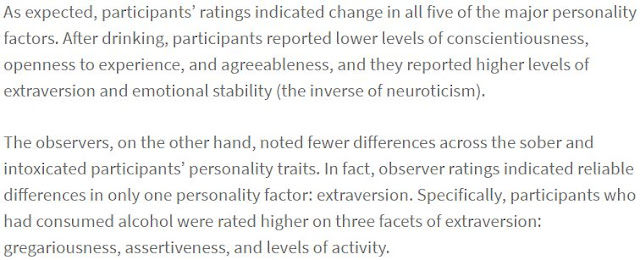How much do our personalities change when we're drunk? Not as much as we think. We know this due to the self-sacrificing research participants who went to a lab, filled out some scales, got drunk with their friends. For science!
Here is the research, as summarized by the first author. Here is the original study.
This example admittedly panders to undergraduates. But I also think it is an example that will stick in their heads. It provides good examples of:
1) Self-report vs. other-report personality data in research.
-Two weeks prior to the drinking portion, participants completed a Big Five personality scale as if they were drunk. So, there is the self-report of Drunk!Participant. And during the drinking session, participants had their Big Five judged by research assistants coding their interactions with friends, allowing a more object judgment of the Drunk!Participant.
The findings:
-Why do we need self and other reports? What sort of traits are people most likely to lie about? This could also open up a conversation about Lie scales, especially their use in situations when their is pressure to present well, like during job interviews.
-What other sort of other-reports have your students seen used in research? I've seen research that asks teachers to evaluate students, parents to evaluate children, etc. When might an acquaintance be a better source of data than a stranger?
2) Conceptual examples of repeated measure/within subject t-test and paired-participant/between subjects t-test.
-At Time 1, Ps reported their personality under normal circumstances, and what they think think of their personalities when drunk. Within-subject t-test. Results: Ps believe that their personalities change substantially when drunk.
-At Time 2, while the participants were drunk, they were observed by research assistants. The research assistants made their best guesses at the Ps Big Five. Between-subject, matched t-test. Results: P extroversion seems to increase, but raters didn't find any other increases.
3) Example of using the Big Five in research.
Here is the research, as summarized by the first author. Here is the original study.
This example admittedly panders to undergraduates. But I also think it is an example that will stick in their heads. It provides good examples of:
1) Self-report vs. other-report personality data in research.
-Two weeks prior to the drinking portion, participants completed a Big Five personality scale as if they were drunk. So, there is the self-report of Drunk!Participant. And during the drinking session, participants had their Big Five judged by research assistants coding their interactions with friends, allowing a more object judgment of the Drunk!Participant.
The findings:
 |
| https://www.psychologicalscience.org/news/releases/personality-may-change-when-you-drink-but-less-than-you-think.html#.WUP0o-vyvIV |
-Why do we need self and other reports? What sort of traits are people most likely to lie about? This could also open up a conversation about Lie scales, especially their use in situations when their is pressure to present well, like during job interviews.
-What other sort of other-reports have your students seen used in research? I've seen research that asks teachers to evaluate students, parents to evaluate children, etc. When might an acquaintance be a better source of data than a stranger?
2) Conceptual examples of repeated measure/within subject t-test and paired-participant/between subjects t-test.
-At Time 1, Ps reported their personality under normal circumstances, and what they think think of their personalities when drunk. Within-subject t-test. Results: Ps believe that their personalities change substantially when drunk.
-At Time 2, while the participants were drunk, they were observed by research assistants. The research assistants made their best guesses at the Ps Big Five. Between-subject, matched t-test. Results: P extroversion seems to increase, but raters didn't find any other increases.
3) Example of using the Big Five in research.

Comments
Post a Comment